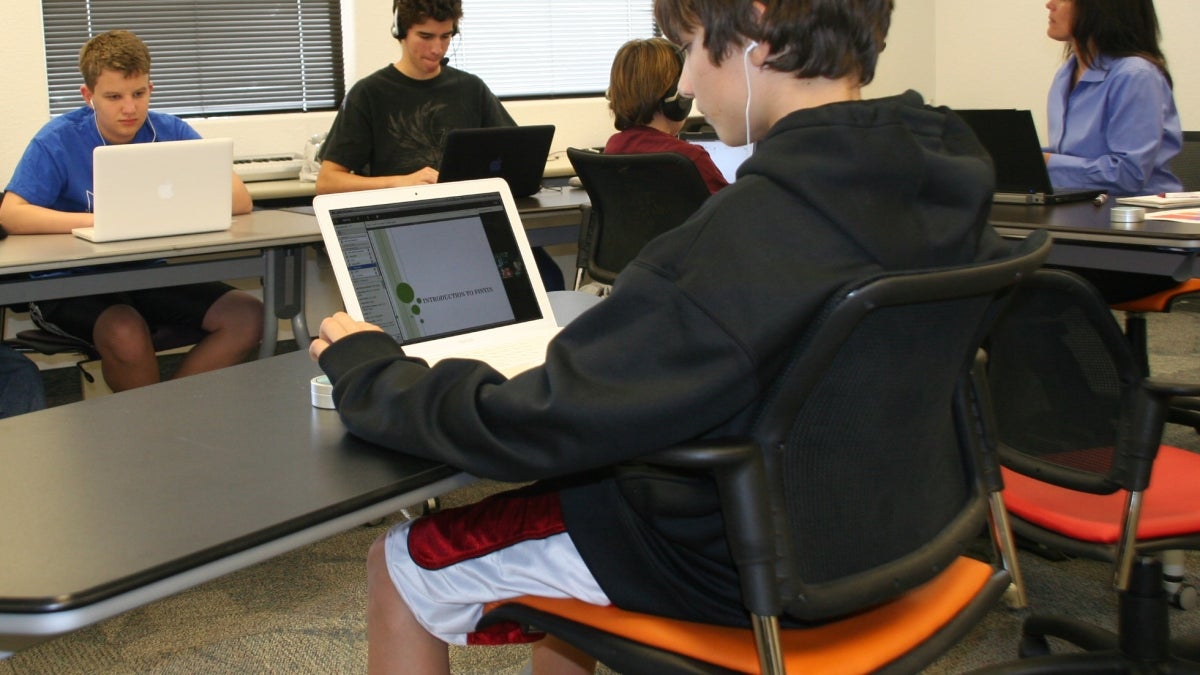Gifted students work to master Mandarin

Working with an instructor via videoconference, students at ASU’s Gary K. Herberger Young Scholars Academy are learning Mandarin, the language that is spoken by the largest number of people in the world.
The Herberger Academy serves gifted middle school and high school students. Several of the school’s students chose to spend time twice a week using technology to work with a Mandarin instructor. Their study of the language also involves use of cloud-based collaboration tools and online platforms that are rapidly becoming fundamental tools for global business, academics, diplomacy and social interaction.
The academy contracts with the educational programming organization mylanguage360 to provide the instructor and the technology and support services the students use as they study the language.
“Offering Mandarin is part of the Herberger Academy’s goal to incorporate global learning into the curriculum,” said Kimberly Lansdowne, the academy’s executive director. “We also are a ‘paper free’ school. Our entire curriculum is web-based, and content is pushed to students via iPad or laptops. By using a program like mylanguage360, our students are able to use 21st century technology skills while being environmentally conscious.”
Andrew Polito, co-founder of mylanguage360, said the program offers a cost-effective way to offer specialized subjects like Mandarin. “Schools are able to draw from a broader pool of teaching talent, since they are not limited to choosing from teachers who live in the same geographical area,” he said.
“Most of our U.S. teachers are originally from mainland China or Taiwan, and all are highly qualified state-certified teachers,” Polito said. “We have a curriculum development team in mainland China, and some instruction is provided by teachers located in Taiwan.”
Herberger Academy students are enthusiastic about the experience.
“When you talk to someone in their native tongue, you can just see their face light up,” said Eric Slosky, who is experiencing his first endeavor learning a foreign language. While he isn’t yet accomplished enough at Mandarin to engage in extensive conversations, Slosky said he has enjoyed being able to communicate “somewhat” in Mandarin with the owner and staff of a Chinese/Japanese restaurant he frequents with his family.
Student Molly Baker and her family actually lived in China for a few years. She said the ability to learn a Mandarin from an instructor who is native to China is critical. “Otherwise your accent will be horrible,” she said.
For Gavin Carns, his current experience with Mandarin is reaping significantly more positive results than when he studied Spanish in elementary school. “I feel I learned more Mandarin in my first semester than the amount of Spanish I learned in three or four years,” Carns said.
Lansdowne, who has the opportunity to sit in with the students during their videoconference lessons, is impressed with their progress. “I can tell you first-hand that it is a hard language to learn! In addition to learning about the Chinese culture, they are learning how to write and copy characters which make up the Chinese pinyin alphabet. The instructor focuses on grammatical structures, vocabulary, and pronunciation. Mastering Chinese provides a rigorous mental workout for the students.
“It is likely that our students, in their lifetime, will have several different careers,” Lansdowne said. “Learning a foreign language, especially Mandarin, and being knowledgeable about the world will benefit our students as they move through diverse careers. China is quickly becoming a global power, and learning Mandarin will prepare our students to more fully understand some of our world’s issues and learn how to work together with other countries to make the world a better place.”
Added Polito, “Chinese is quickly emerging alongside English and Spanish as a major global language for business, diplomacy, science, and popular culture. A command of Mandarin Chinese can open up a world of career and academic opportunities for students, as well as giving them a window of understanding into the rising 21st century superpower that is China. Unlike languages such as Russian or Japanese, which gained popularity in past decades due to short-lived economic and political trends, Mandarin is likely to remain strongly relevant as a world language for generations to come.”
In addition to career and academic benefits, studying a challenging language like Mandarin can help students to improve their academic skills, think in new ways, and build confidence.
“As a tonal language with logographic writing, Mandarin is quite different from English,” Polito said. “For native English speakers learning Mandarin, the experience presents an opportunity to stimulate and strengthen language centers in the brain in new ways, which may have farther-reaching cognitive benefits.”
The Herberger Academy, an initiative of ASU’s Mary Lou Fulton Teachers College, is located on ASU’s West campus at 4701 W. Thunderbird Road in Phoenix. The academy is Arizona’s first university-based school specifically designed to meet the unique educational, social and emotional needs of gifted young adolescents.
The school was founded through The Herberger Strategic Investment Fund, which was established by a $20-million gift from university benefactors Gary K. and Jeanne L. Herberger. The fund, part of the University’s Strategic Investment Program, is administered by the President’s Office and provides resources on a competitive basis to individual ASU units to launch, initiate and secure substantial additional funding for programs of strategic importance to the university.
Applications are now being accepted for gifted students interested in joining the Gary K. Herberger Young Scholars Academy when the next cohort begins its studies in August. More information is available at http://herbergeracademy.asu.edu/.